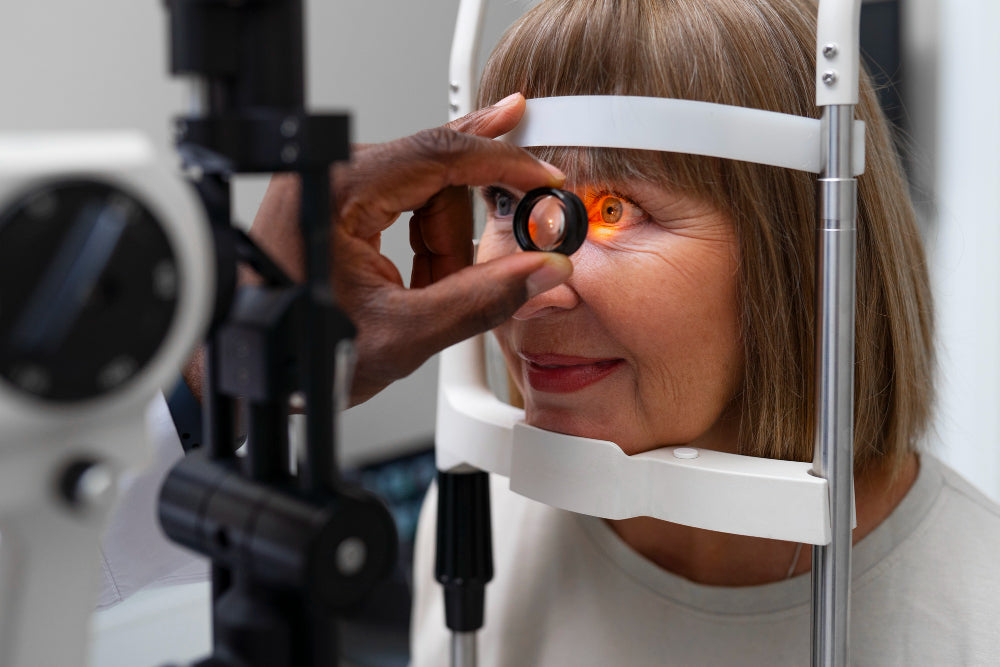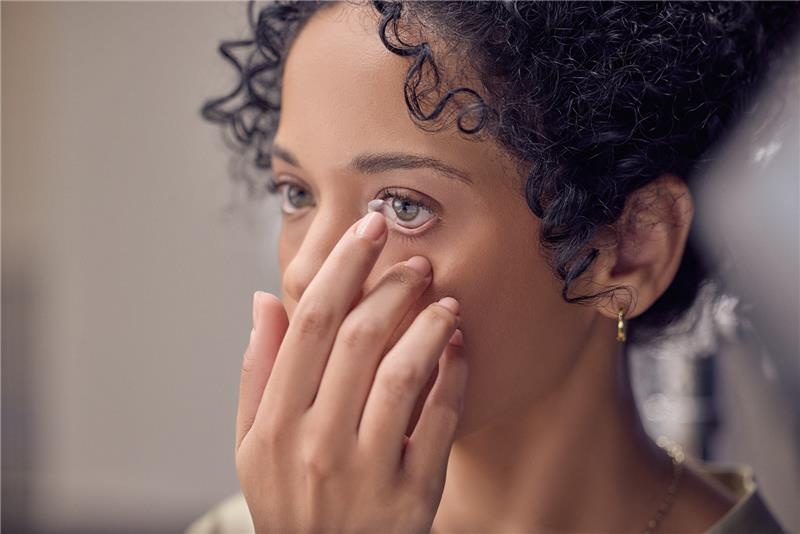Are you experiencing blurred vision after cataract surgery? Are you concerned that it's normal or an indication that surgery was unsuccessful?
Blurry vision after the cataract surgery can be normal. The good news is that it is temporary in most cases and an indication that your eye is healing.
But you might still be wondering, why is my vision getting worse after cataract surgery? Let’s explore why this might happen and address some of the questions you may have.
How Long Does Blurry Vision Last After Cataract Surgery?
Blurred vision after cataract surgery is common for a few days, as the eye needs time to heal and adjust to its new, clear lens. Here are some reasons why this might occur:
Assimilation to Intraocular Lens (IOL)
During cataract surgery, the doctor removes the old cloudy and foggy lens and replaces it with an artificial lens, or IOL (IntraOcular Lens).
Based on this change, the brain might need some time to adjust to the new lens and experience a little difficulty at first, comprehending the new shape of the images formed on the retina.
Corneal Changes
Irregularities in the cornea are another reason one might experience blurriness after cataract surgery. During the surgery, the shape of the cornea may be altered, inducing or changing astigmatic correction on the eye.
Inflammation And Swelling
During and after the surgery, the cornea may swell, which affects the way light entering the eye is bent to focus on the retina.
Inflammation is a healthy immune response to changes in the body, and it can cause some temporary blurriness of your vision.
Visual Processing Transformation
Most people experience dull colors while dealing with cataracts; however, after the surgery, the colors become vibrant again, and the brain may become temporarily confused by these new vibrantly colored images.
It may require a little time to adjust to the new color changes; vibrancy, saturation, clear vision, and more light being focused cleanly onto the retina.
Complete Healing
Everything needs time to heal and regain proper function. Your eyes and brain need time to heal, adjust, adapt, and function as new after the surgery.
Sight-Threatening Reasons For Blurred Vision After Cataract Surgery

Blurred vision right after cataract surgery is normal if it is temporary. However if days turn into months or years, it's a bigger issue and a serious health concern. Some possible conditions associated with blurred vision after cataract surgery are:
Posterior Capsular Opacification (PCO)
PCO, often called after-cataract, describes a condition in which the rubbing of the new man-made lens on the posterior capsule causes a film that clouds the vision. It is one of the complications that may occur months or years after cataract surgery.
Some people call it a secondary cataract, although it’s more of an opacity that grows over the membrane that holds the new man-made lens in place.
It has been reported that around 20% of patients experience PCO within five years after cataract surgery. Let's break down the terms to help us understand this phenomenon better.
- Posterior refers to the rear portion of the eye.
- Capsule refers to the transparent sac that holds the lens in place.
- Opacification refers to clouding.
PCO treatment is simple, quick, and painless. It can be done in about 30 seconds. The eye doctor removes it with the patient seated comfortably at the microscope using a YAG laser to place 5 holes in the posterior capsule holding the IOL. This simple procedure opens up a hole in the posterior capsular bag that restores clear vision to the patient.
Retinal Detachment
During or after the surgery, the retina can separate from the back of the eye, causing obstructed, blurred, and shadowy vision. This will appear as a curtain or shadow or shade moving down or up over the vision where the vision will be obstructed.
Retinal detachment is a serious eye condition in which the retina separates from the back of the eye, thereby blocking the source of nutrients and oxygen to the retina.
The images you see in your vision are formed on the retina. Therefore if the retina becomes detached it could lead to permanent vision loss and blindness.
Many people experience flashes of light and floating forms in their vision prior to experiencing retinal detachment. Let's examine these terms a bit closer:
- Retina is the term used to describe the light-sensitive layer of neural tissue at the back of the eye. The retina transforms rays of light into electrical signals which it then sends to the brain. This is what allows you to see.
- Detachment refers to the separating of the top 9 layers of the retina from the 10th retinal layer or retinal pigment epithelium which is attached to the sclera, or white part of the eye at the back of the eye.
Retinal detachment treatments involve surgical repair to attempt to reattach the separated 9 layers of the retina to the 10th layer that remains tightly affixed to the sclera. They involve various forms of laser, surgically sewing in a silicone “scleral buckle”, freezing the retina back in place with a cryogenic probe, and even removing the natural vitreous gel inside the eye and replacing it with a mixture of biocompatible gas and oil.
Retinal detachment is a medical emergency; if you experience its symptoms, you must rush to the eye doctor or nearest emergency room (who will have an eye doctor on call). Retinal detachment requires urgent care in most cases. If left untreated, it can lead to permanent vision loss.
Cystoid Macular Edema (CME)
The area of the retina responsible for your central vision is called the macula. CME refers to a condition where the macula experiences swelling. This causes blurred and distorted vision.
CME affects 2% of patients who have cataract surgery and is typically experienced 5-8 weeks after surgery. The breakdown of these terms follows:
- Cystoid refers to the formation of cyst-like swollen spaces in the macula.
- Macular refers to the central part of the retina called the macula.
- Edema is the swelling in the eyes caused by fluid buildup under the macula.
CME can be caused by diabetic retinopathy, uveitis, retinal vein occlusion, or cataract surgery. Treatments include non-steroidal anti-inflammatory eye drops (NSAIDs).
Other treatments include anti-VEGF injections, LASER surgery, and treatment of underlying diseases. Early treatment of CME can help prevent vision loss.
Tips to Speed Up Recovery
We know that living life under precautions is daunting. One can quickly become frustrated with restrictions and limitations.
But what if you could speed up the healing process and recover quicker than expected? Would you be motivated to follow the guidelines? In so doing, you can comfortably recover earlier.
- Use your eye drops and take prescribed medications on time.
- Eat a healthy diet rich in protein and natural fats.
- Wear a protective eye shield at night for a week.
- Avoid bending over at the waist for a week.
- Prevent strenuous activities for a couple of weeks.
- Avoid things that trigger your allergies.
- Do not rub your eyes.
- Avoid processed foods and vegetable and seed oils.
- Appropriately manage stress.
- Skip the pool and hot tub for 4-6 weeks.
- Reduce the use of makeup, soap, and fragrance near the eyes.
- Rest. Sleep more during recovery.
How Long is Vision Blurry After Cataract Surgery: Other Factors

Previously, we discussed why one might experience blurry vision after cataract surgery. However, there are still some other side effects of cataract surgery that can cause blurred vision.
Dry Eyes
Patients can experience dry eyes due to the long-term use of antibiotics and steroid eye drops before and after the surgery.
The two main reasons why one might experience dry eyes after cataract surgery are listed below:
Disruption Of Tear Film: The tear film is a protective coating on the surface of your eye that helps keep your eyes moist and washes away dust and debris when you blink.
During surgery, incisions are made on the cornea to access the lens, which can temporarily disrupt proper tear flow and cause eye dryness.
Nerve Disruption: Did you know that the highest concentration of nerve fibers in your body is in your cornea? These tiny nerves signal dryness to the brain. Some of these nerves get damaged during cataract surgery, severing the connection between the brain and the eye.
Good quality non-preserved artificial tears, like Optase and Retain can ease dryness and help alleviate blurred vision.
Red Eyes
Red eyes are common after cataract surgery. They usually occur due to inflammation or damaged blood vessels, which can even cause a subconjunctival hemorrhage.
As part of the healing process, steroid drops are prescribed which can help reduce redness and inflammation.
When Should I Call a Doctor?
You should see a doctor if:
- You see floaters or flashing lights in your vision.
- You feel like a curtain or cloud or shade has come over your vision and it does not clear up.
- You experience pain and redness that are not resolved with your prescribed eye drops.
- You are experiencing excessive blurriness of your vision that does not go away.
Key Takeaways
Blurred vision after cataract surgery is normal if it happens for a few days. But if it exceeds that, make an appointment to see the doctor.
Dry eye, cystoid macular edema, posterior capsular opacification (PCO), and general inflammation are common causes of blurred vision after cataract surgery. Greyed out vision or flashes and floaters could indicate retinal detachment. While retinal detachment after cataract surgery is not terribly common, it does require immediate attention. Call the office today if you think something is wrong.
Good quality non-preserved artificial tears can produce temporary relief after cataract surgery. But if blurred vision persists, see the doctor.
If you feel you may need cataract surgery, schedule an appointment with one of our optometric physicians for a consultation today.
Explore More:





